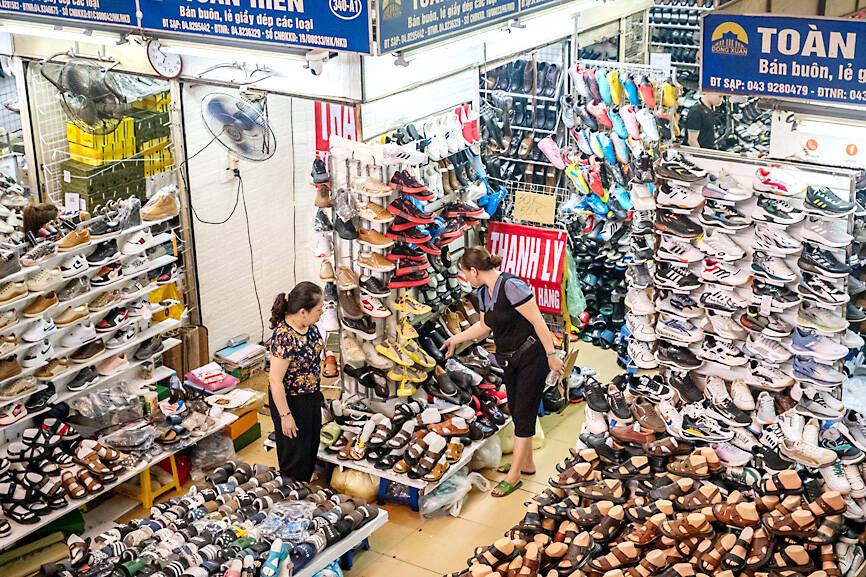One of Vietnam’s largest shoemakers for brands such as Nike Inc, Adidas AG and Reebok International Ltd is to cut jobs for the third time this year, state media said yesterday, citing a lack of orders.
The Southeast Asian country is among the world’s largest exporters of clothing, footwear and furniture, but its economic growth has been slow in the first half of the year as a slump in demand hits exports.
PouYuen Vietnam Co, a unit of Taiwan-based Pou Chen Group (寶成), is to lay off about 1,200 workers with permanent contracts from the end of this month, VnExpress said, citing a local official in Ho Chi Minh City.

Photo: Bloomberg
“PouYuen Vietnam said the job cuts are due to no recovery in terms of orders. Only a few clients made orders,” VnExpress reported.
The firm is among the largest employers in Ho Chi Minh City, Vietnam’s commercial capital, with an estimated 40,000 workers.
This is the third time this year that it has cut jobs. It announced in May that almost 6,000 workers with permanent contracts would be laid off, after letting go almost 3,000 permanent staff in February.
That came after PouYuen put 20,000 of its workers on paid leave in rotation last year.
More than 217,000 workers lost their jobs in Vietnam during the second quarter of this year, the Vietnamese General Statistics Office said.
They were mainly working to produce textiles, footwear and electronics.

When an apartment comes up for rent in Germany’s big cities, hundreds of prospective tenants often queue down the street to view it, but the acute shortage of affordable housing is getting scant attention ahead of today’s snap general election. “Housing is one of the main problems for people, but nobody talks about it, nobody takes it seriously,” said Andreas Ibel, president of Build Europe, an association representing housing developers. Migration and the sluggish economy top the list of voters’ concerns, but analysts say housing policy fails to break through as returns on investment take time to register, making the

‘SILVER LINING’: Although the news caused TSMC to fall on the local market, an analyst said that as tariffs are not set to go into effect until April, there is still time for negotiations US President Donald Trump on Tuesday said that he would likely impose tariffs on semiconductor, automobile and pharmaceutical imports of about 25 percent, with an announcement coming as soon as April 2 in a move that would represent a dramatic widening of the US leader’s trade war. “I probably will tell you that on April 2, but it’ll be in the neighborhood of 25 percent,” Trump told reporters at his Mar-a-Lago club when asked about his plan for auto tariffs. Asked about similar levies on pharmaceutical drugs and semiconductors, the president said that “it’ll be 25 percent and higher, and it’ll

CHIP BOOM: Revenue for the semiconductor industry is set to reach US$1 trillion by 2032, opening up opportunities for the chip pacakging and testing company, it said ASE Technology Holding Co (日月光投控), the world’s largest provider of outsourced semiconductor assembly and test (OSAT) services, yesterday launched a new advanced manufacturing facility in Penang, Malaysia, aiming to meet growing demand for emerging technologies such as generative artificial intelligence (AI) applications. The US$300 million facility is a critical step in expanding ASE’s global footprint, offering an alternative for customers from the US, Europe, Japan, South Korea and China to assemble and test chips outside of Taiwan amid efforts to diversify supply chains. The plant, the company’s fifth in Malaysia, is part of a strategic expansion plan that would more than triple

Taiwanese artificial intelligence (AI) server makers are expected to make major investments in Texas in May after US President Donald Trump’s first 100 days in office and amid his rising tariff threats, Taiwan Electrical and Electronic Manufacturers’ Association (TEEMA, 台灣電子電機公會) chairman Richard Lee (李詩欽) said yesterday. The association led a delegation of seven AI server manufacturers to Washington, as well as the US states of California, Texas and New Mexico, to discuss land and tax issues, as Taiwanese firms speed up their production plans in the US with many of them seeing Texas as their top option for investment, Lee said. The